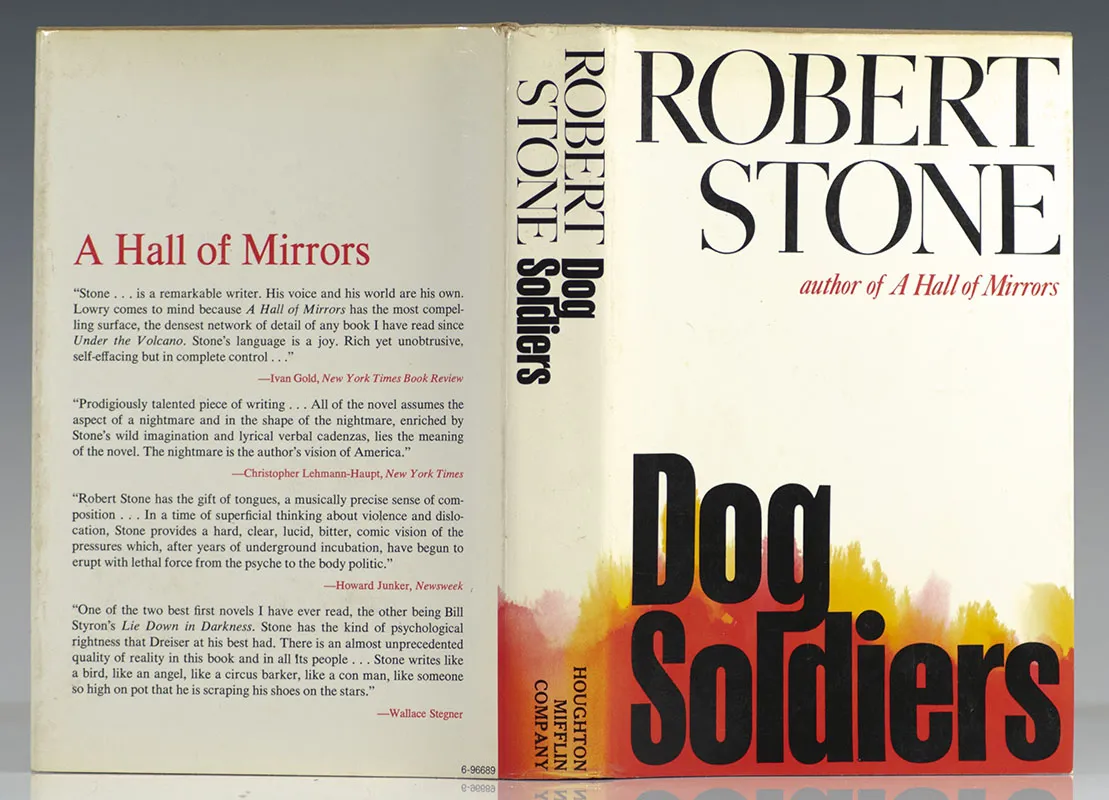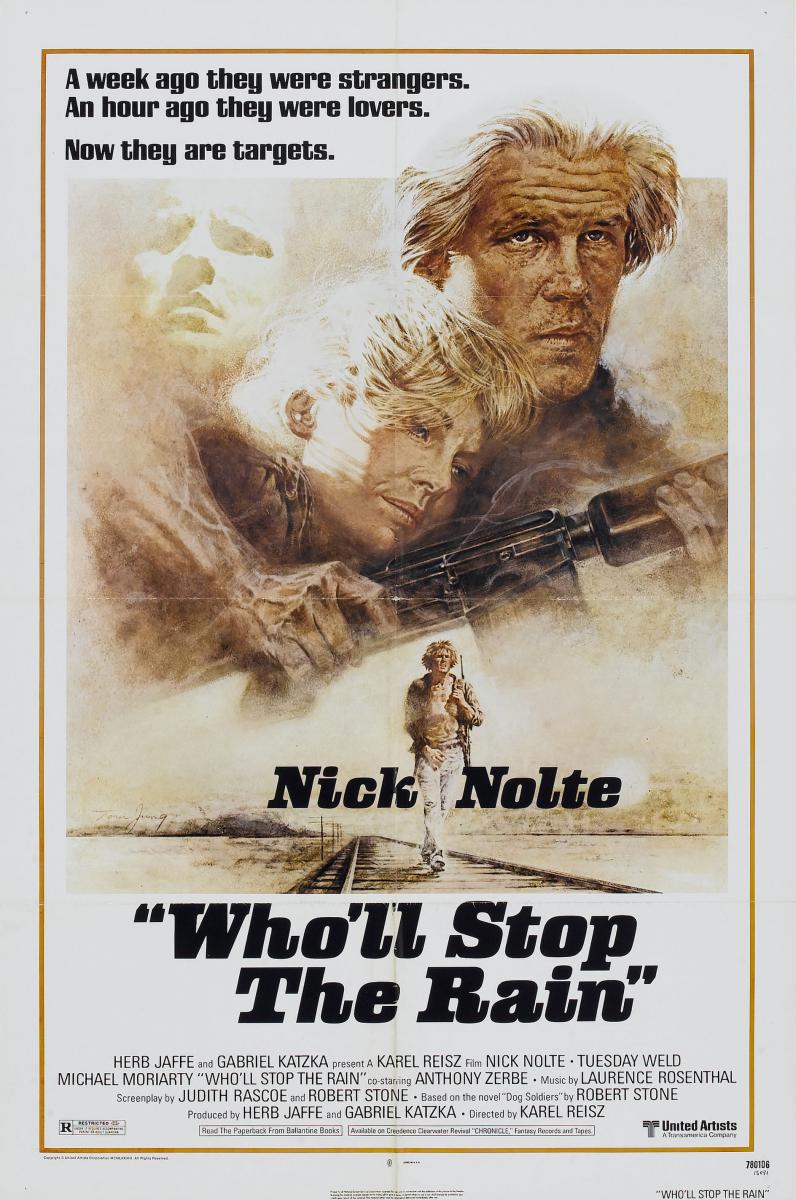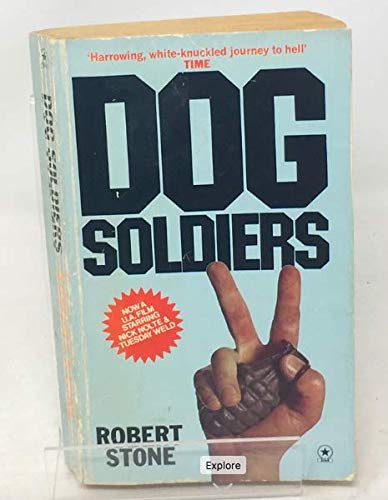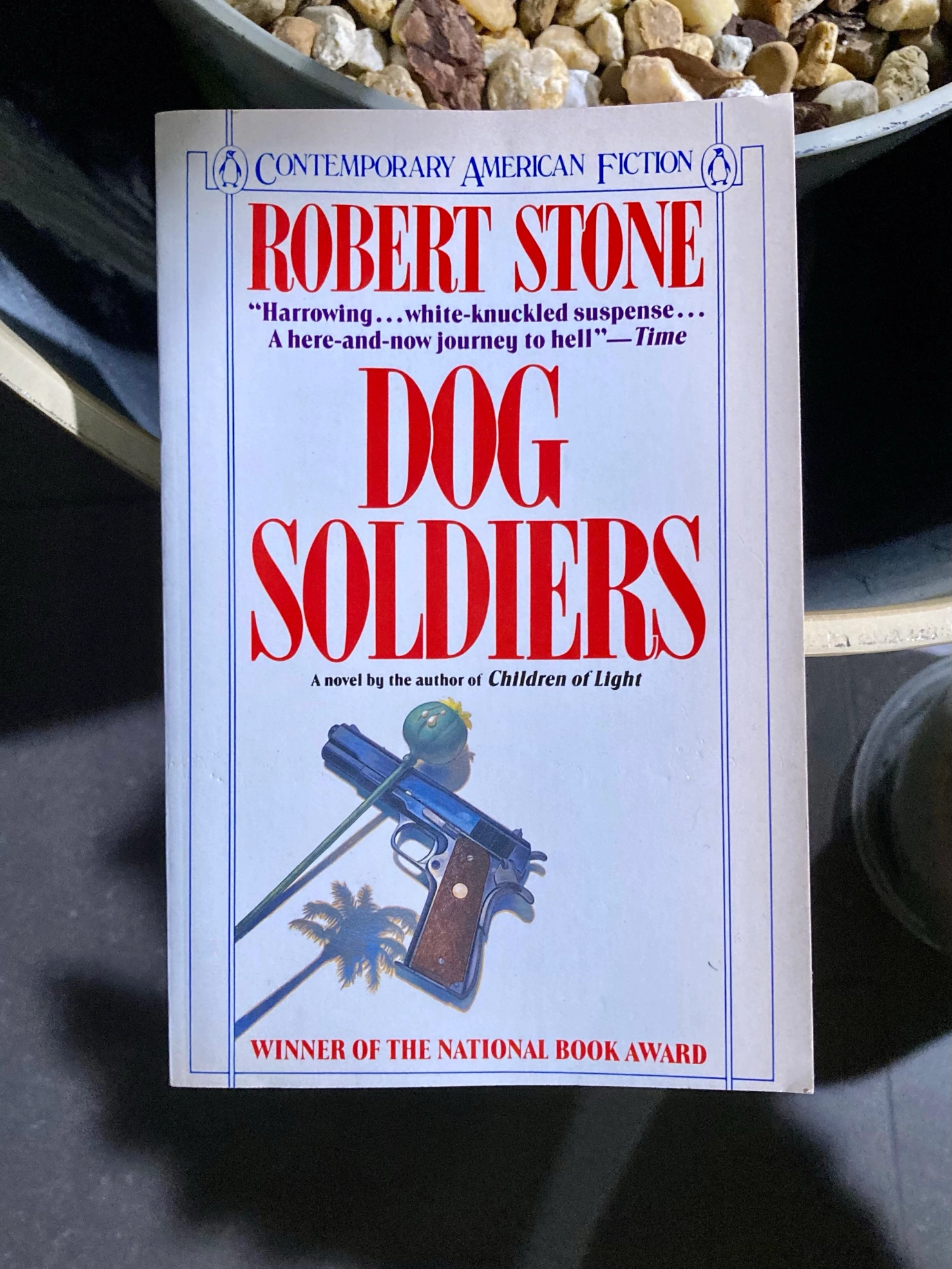I devoured Dog Soldiers by Robert Stone this week. It had me up past my bedtime, racing toward the end. In this rather literary thriller, we join lightly shell-shocked American journo John Converse in Vietnam, writing for “Nightbeat, which his lawyers described as A Weekly Tabloid With a Heavy Emphasis on Sex,” as he gives up on ever writing his novel to try his hand at running heroin instead. It fits squarely into one of my favorite subject areas in American literature – the clash between the state and the psychadelic spirit, war and counter-culture, conspiracy and love, or, how the 60s were lost.
Dog Soldiers opens with a feverish Converse on a park bench in Saigon, reading a letter from his strangely disaffected wife who recounts a recent trip to New York, where she and some friends “went to a parade which was for the War”:
Three of us—me, looking relatively straight, and Don and Cathy looking modified freaky. We weren’t too well received. You had to see that action to believe it. … My flash was that these people are freakier than we ever could be. One tends to think of them as straight but when you see them they’re unreal.
(This observation is every bit as true in the Trump era as it was then.)
This sense of unreality pervades the novel – if the States have become “funnier,” as characters warn each other repeatedly, Vietnam itself may be the corrupting influence. Converse converses with an American missionary sharing his park bench between reading snatches of his letter. “‘Satan,’ she called to him, ‘is very powerful here.’ ‘Yes,’ Converse said. ‘He would be.’” Or, as Sergeant Janeway says to Converse as he arranges a pretext to see his pal Hicks, who can transport the dope – “Every day in this place … we entertain the weird, the strange, the unusual.”
Not to mention the deadly. Converse’s own brush with death comes prior to the action of the novel:
Converse had watched with astonishment as the world of things transformed itself into a single overwhelming act of murder. In a manner of speaking, he had discovered himself.
This experience grants Converse a fundamental insight: “that the ordinary physical world through which one shuffled heedless and half-assed toward nonentity was capable of composing itself, at any time and without notice, into a massive instrument of agonizing death.” From there – it’s only natural – “He found fearlessness an extremely difficult state to conceive, like the hereafter.” And yet: “From the bottom of his heart, he concurred in the moral necessity of his annihilation.”

raptisrarebooks.com
All of the characters in Dog Soldiers appear to be in the grip of nihilism. Converse’s wife Marge, for example, on whether to do the deal:
I’m prepared to take chances at this point and I don’t respond to the moral objections. The way things are set up the people concerned have nothing good coming to them and we’ll just be occupying a place that someone else will fill fast enough if they get the chance. I can’t think of a way of us getting money where the money would be harder earned and I think that makes us entitled.
At one point, Marge and Hicks are on the run, desparately trying to stop holding the bag, and Hicks decides to make a risky call. “Whatever’s right”, Marge says, which seems to me to be her motto. Whatever, man – it doesn’t matter.
The drug caper places these characters on a dangerous path, in which finally they are able to “discover” themselves in moments of absolute do-or-die tension. Late in the plot, Converse is held hostage by a couple of whacked-out narcs who are trying to recover the smuggled heroin. While not fearless, “he felt intensely aware and alive, the way he had felt in the moment when he decided to buy the dope for Charmian.” It’s exactly this feeling that seems to be the real drug, at least for the male characters. Hicks has a similar moment, deciding whether to abandon Marge and flee for safety, or to press on:
If I walk away from this, he thought, I’ll be an old man—all ghosts and hangovers and mellow recollections. Fuck it, he thought, follow the blood. This is the one. This is the one to ride till it crashes.
In the grand tradition of drug capers, the plot operates in an air of justified paranoia and of course a bent cop – a slick operator named Antheil – is at the center of it. He’s … a “regulatory agent” (?)
“Because he works for a regulatory agency. And that’s what he calls himself.” “I see,” Converse said. “He knows everybody, right? He’s got a lot of sources. He pays them. I don’t know if he stands still for their dealing but I guess he’d have to."
One of his goons explains how he was brought into Antheil’s power, a crisp and plausible description of the kind of Gestapo tactics that (one assumes) contributed to the poisoning of the hippie psyche:
“So my status was weird because I’m just out of the hatch. I got passed around from one guy to another and I end up in the Federal Building having a long talk with this Irishman. I can have a break if I’ll go out to this college on Long Island and hang with the radicals there. They have me by the balls. On account of the bust they can put me back in the madhouse for life. If I bitch anywhere I’m crazy. If I do what they want, I’ll get maintenance and stay out.
The climax of the novel takes place on a ranch in the desert that was, in the 60s, a hippie commune. It’s a stunning set piece, and also a sad commentary on the pointlessness of it all. I was reminded of how the Velvet Underground (heroin) and the Grateful Dead (acid) did not get along at all. I was struck by this image, presented to Hicks as he makes his fateful escape from the compound through an underground passage:
There Are No Metaphors, it said – in violet – on one wall. Everywhere he turned the light there were fossilized acid hits, a riot of shattered cerebration, entombed.
An apparently profound nothing.
In the end, of course, the bent cop comes out on top. Stone treats us to a deliciously ironic piece of moralizing on the final page, as Antheil reflects on his own good outcome (at least 5 people have just been murdered in pursuit of the heroin):
If you stuck with something, the adventure demonstrated, faced down every kind of pressure, refused to fold when the going got tough, outplayed all adversaries, and relied on your own determination and fortitude, then the bag of beans at the end of the rainbow might be yours after all.
It was adapted to feature film starring Nick Nolte in Who’ll Stop the Rain (1978). I can’t wait to watch it!


